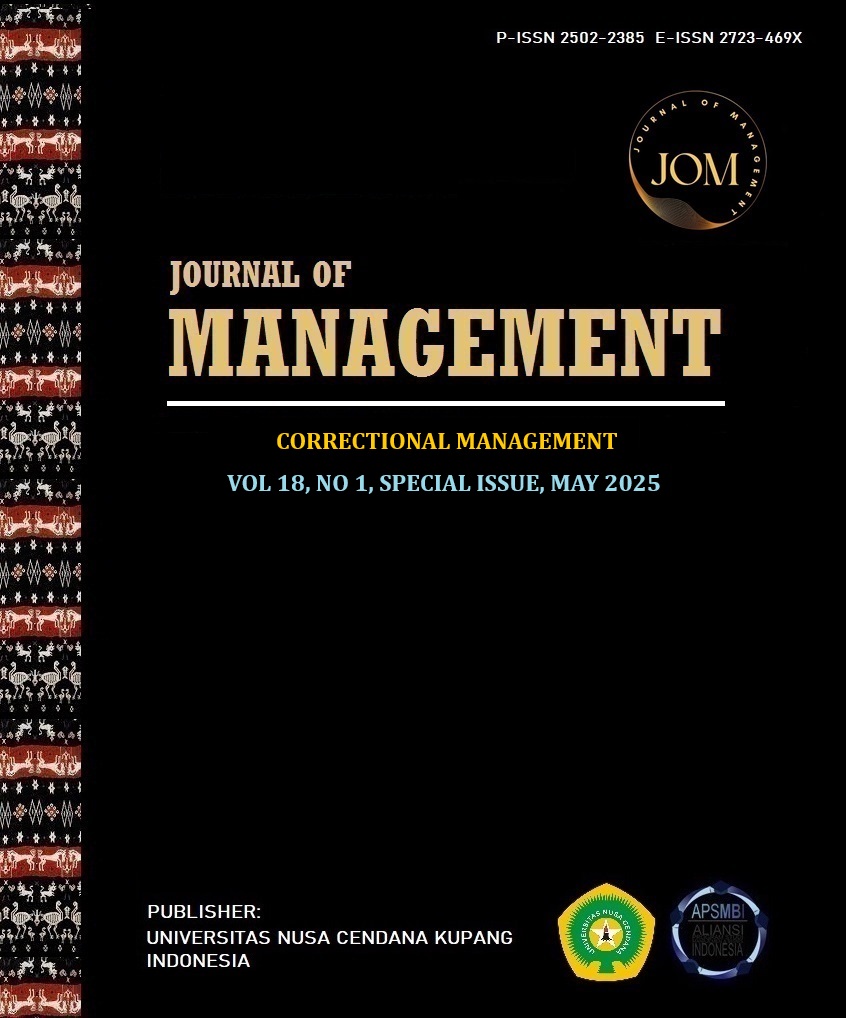AN OVERVIEW OF PSYCHOLOGICAL WELL-BEING AMONG INMATES SERVING AS KITCHEN WORKERS AT CLASS IIB BANGKALAN STATE DETENTION CENTER
Abstract
The psychological well-being of inmates serving as kitchen trustees needs to be considered as an effort to maintain their security, order, motivation, and work quality in their daily tasks. This will affect their self-acceptance, positive relationships with others, autonomy, environmental mastery, life purpose, and self-development, enabling them to maximize their assistance to officers in providing daily meals to inmates, whose numbers are disproportionate to the existing kitchen trustees. This study uses the psychological well-being theory to understand the psychological well-being of inmates working as kitchen trustees. The research employs a qualitative method with a descriptive approach, utilizing both primary and secondary data sources, which include interviews, observations, and document studies. We conducted data analysis through the processes of data collection, data reduction, data presentation, and conclusion drawing. The results of the study indicate the need for an evaluation of the motives and reasons inmates become kitchen trustees, the weakening of positive relationships with others, difficulties in performing daily activities, handling challenges and shortages as kitchen trustees, unclear life vision, and the underdevelopment of their potential.
Keyword: Kitchen Trustees; Prisoner; Psychological Well-Being
Downloads
References
Edward, Heliany, I., & Hansen, L. (2023). Ektifitas Peran Tahanan Pendamping Di Dalam Sistem Pemasyarakatan Berdasarkan Peraturan Menteri Hukum Dan Hak Asasi Manusia Nomor 7 Tahun 2013 Tentang Pengangkatan Dan Pemberhentian Pemuka Dan Tamping Pada Lembaga Pemasyarakatan Kelas 1 Cipinang . Legal Student Scientific Journal, 3, 1–25.
Ghazanfari, H., Miri, S., Taebi, M., & Farokhzadian, J. (2023). Psychological wellbeing, family cohesion, and purposeful life in male prisoners: A cross-sectional study. Frontiers in Psychiatry, 13. https://doi.org/10.3389/fpsyt.2022.1054149
Hamzah, I., Muhammad, A., & Subarkah, M. Z. (2020). Psikologi Penjara : Penerapan Psikologi dalam Proses Pemasyarakatan (pertama). CV. Ainun Media.
Hamzah, I. (2020). Psikologi Klinis dalam Konteks Pemasyarakatan (pertama). CV. Insan Cendekia Mandiri.
Hidalgo, J. L. T. (2010). Psychological Well-Being, Assesment Tools and Related Factors.
Hisyam, C. J., Lestari, D., Hilyatussholehah, H., Rangratu, O., Syafiq, R., & Anggraeni, S. D. (2024a). Kebermanfaatan Tahanan Pendamping (Tamping) dalam Operasional Sistem Lembaga Pemasyarakatan. Jurnal Riset Rumpun Ilmu Sosial, 3(1), 145–157. https://doi.org/10.55606/jurrish.v3i1.2362
Peraturan Menteri Hukum Dan Hak Asasi Manusia Republik Indonesia Nomor 9 Tahun 2019 Tentang Pengangkatan Dan Pemberhentian Pemuka Dan Tamping Pada Lembaga Pemasyarakatan
Peraturan Menteri Hukum Dan Hak Asasi Manusia Republik Indonesia Nomor 40 Tahun 2017 Tentang Pedoman Penyelenggaraan Makanan Bagi Tahanan , Anak Dan Narapidana
Samsu. (2021). Metode Penelitian : Teori dan Aplikasi Penelitian Kualitatif, Kuantitatif,Mixed Methods, serta Research & Development (Edisi Kedua). Pusat Studi Agama dan Kemasyarakatan.
Sari, P. N. (2017). Psychological Well-Being Pada Individu Yang Hidup Sendiri. Universitas Sumatera Utara.
Undang-Undang Republik Indonesia Nomor 22 Tahun 2022 Tentang Pemasyarakatan
Wells, I. E. (2010). Psychological of Emotion, Motivation, and Action “Psychological Well-Being.” Nova Science Publisher.

 Fiqi Rheza Firmansyah(1*)
Fiqi Rheza Firmansyah(1*)



